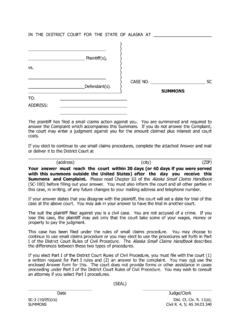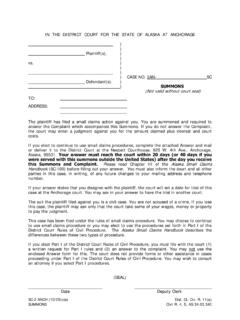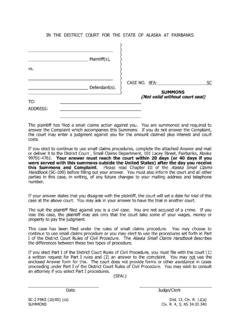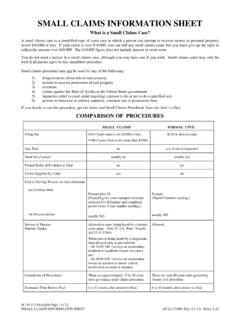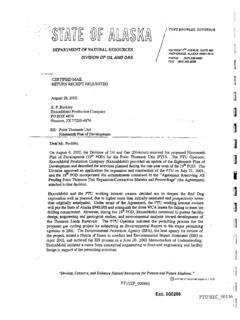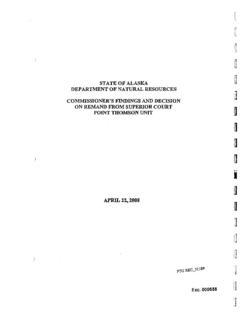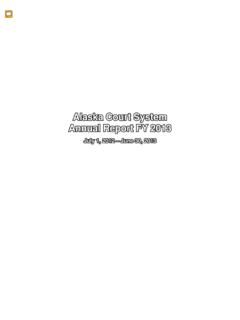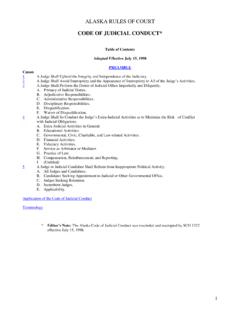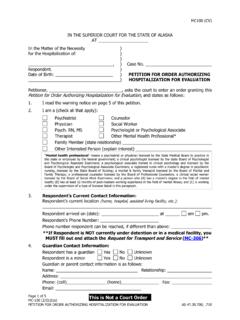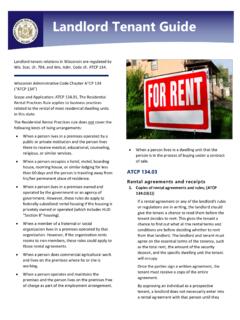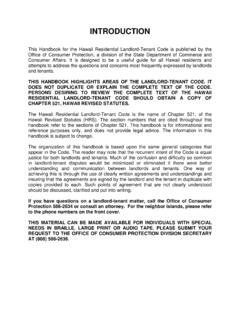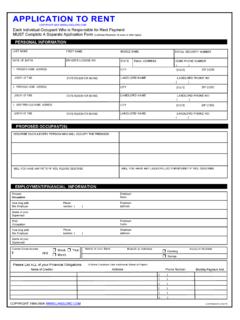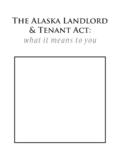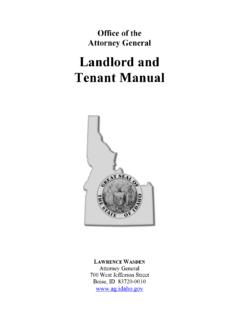Transcription of Alaska Landlord and Tenant Act, PUB-30
1 Alaska Landlord and Tenant Act Published by the Alaska Court System PUB-30 (10/18). NOTICE: This publication includes a summary of Landlord and Tenant rights and obligations under Alaska law, provided by the Alaska Department of Law. Their publication was last updated in 2014. Go to to update this printed information. In accordance with Alaska Statute (AS). (b)(9), information in their publication has been approved by the Alaska Department of Law. The Alaska laws governing Landlord and Tenant rights and obligations reproduced here are from the 2018 Alaska Statutes. Laws are subject to revision by the legislature. It is your responsibility to check for any amendments to the Alaska Statutes by visiting the Alaska Legislature website at , contacting your nearest Legislative Information Office, or going to your local public or law library. The Alaska Court System offers an electronic version of its Eviction booklet, CIV-720 on its website at CIV-720.
2 Describes procedures for evictions from residential property. CIV-720 is also available at all Alaska Court System locations. The Alaska Court System encourages you to read and familiarize yourself with the Alaska Uniform Residential Landlord and Tenant Act ( Alaska Statute - AS. ) before taking any action affecting your or another person's rights. PUB-30 (10/18) 1. Table of Contents Landlord Tenant Act: What it means to you .. 3. What housing is covered by the Act? .. 3. Definitions .. 3. Moving In Moving Out Get a written agreement .. 4 Give plenty of notice! .. 20. The agreement should include .. 4 How much notice is enough? .. 20. Late charges .. 5 Notice is notice .. 21. Resolving disputes .. 5 How to deliver notice .. 21. Understanding the agreement .. 5 Cleaning up & clearing out .. 21. What to watch out for .. 5 Damages .. 21. Standard form agreements .. 6 Returning the deposit.
3 22. Illegal provisions in the contract .. 6 When Landlord keeps the deposit .. 22. Special rules for mobile home rentals .. 6 Termination of tenancy .. 23. Unsigned or undelivered agreements .. 6 Termination for late rent .. 23. What is a lease? .. 7 Termination for deliberate damage .. 23. What is a security deposit? .. 7 Termination for illegal activity .. 24. Where are deposits kept? .. 7 Termination for failure to pay utility bills .. 24. Can deposits earn interest? .. 8 Termination for breach of duties .. 24. When there's a new owner .. 8 Landlord 's termination by choice .. 24. Get a written inspection report .. 8 Termination of mobile home tenancies .. 25. Living by the Landlord 's rules .. 9 Termination for absence or abandonment .. 25. Enforcing the rules .. 9 When is it abandonment? .. 25. Changing the rules .. 9 Abandoned belongings .. 26. If circumstances change .. 9 Holding a public sale.
4 26. When is discrimination illegal? .. 10 Serving a notice to quit .. 27. Foreclosure problems .. 27. Living In a Rental Property Lockouts, utility shutoffs and threats .. 28. The Landlord 's responsibilities .. 11 Subsidized housing .. 28. Property maintenance .. 11 Retaliation by Landlord .. 28. Varying Landlord duties .. 12 When it's NOT retaliation .. 29. Tenant remedies .. 13 If the Tenant won't move .. 29. Housing codes .. 14 How cases work .. 29. Tenant responsibilities .. 14 When a problem arises .. 30. Landlord remedies .. 16 Follow these suggestions .. 30. If the Landlord needs to get in .. 16 Where to go for help .. 31. The lowdown on locks .. 17. Can the Landlord raise the rent? .. 17 Sample Notice Forms .. 32-46. Fire or casualty damage .. 18 Selected Relevant Statutes .. 47-63. Condemned dwellings .. 18. Moving prior to end of lease .. 18. Subleasing .. 19. Lawful reasons for denial.
5 19. PUB-30 (10/18) 2. The Landlord and Tenant Act: what it means to you When a Landlord and Tenant get along well, things are better all around. Dealing with unhappy tenants is a lot of trouble for a Landlord , and few tenants want the inconvenience and expense of moving simply because they cannot get along with their landlords. Yet, landlords and tenants frequently have problems. Sometimes, landlords do not make repairs or unfairly keep back security deposits. Sometimes, tenants damage property or refuse to pay the rent. This booklet briefly explains your responsibilities as a Landlord or a Tenant under the Uniform Residential Landlord and Tenant Act (AS et seq., the Landlord and Tenant Act ). It explains what a Tenant needs to know when the Tenant is: Moving in: .. pages 4 - 11. Living there: .. pages 11 - 19. Moving out: .. pages 20 - 31. Sample forms, such as notices to quit, etc.
6 , begin on page 32. The Landlord and Tenant Act covers rental of a residence, such as an apartment, a mobile home, or a house. It does not apply to rooming houses, hotels or motels, temporary housing at a shelter or supportive housing program, or any type of commercial Tenants who receive a government housing subsidy or live in a government housing project may have rights in addition to those provided by state law. This pamphlet does not cover those issues. Such tenants should check their lease agreements and may also wish to consult with the Alaska Housing Finance Corporation or an attorney for specific advice. Definitions Several important terms are used in this booklet. This is what some of them mean: Dwelling unit, property or premises: the place that is rented, which could be a house, apartment, condo, mobile home, or mobile home park space. Landlord : the property owner or the owner's agent, which could include either a licensed property manager or a resident manager.
7 Property manager: an individual licensed to practice real estate in Alaska who works on behalf of the property owner to rent, manage and safeguard a property. Resident manager: an individual who resides on the property and manages it on behalf of the property owner or the licensed property manager. Tenant : any of the people who rent the dwelling. Damages: money claimed by, or ordered to be paid to, a person as compensation for loss or injury. It may mean the amount claimed by the Landlord from the Tenant 's security deposit based on the damages the Landlord has incurred by reason of the Tenant 's failure to comply with the obligations imposed under the Landlord and Tenant Act. Or it may mean the monetary compensation that a person wins in a lawsuit, such as the value of lost rent or the cost of repairing property damage (to a Landlord ), or the value of housing or utility services not provided (to a Tenant ).
8 Security deposit: payment to a Landlord or property manager by a Tenant to ensure that the Tenant will pay the rent due and will maintain the property and will not damage it. Security deposits are held in trust by the owner or manager until the Tenant moves out, and are then returned or applied to pay for damages and/or delinquent rent with an accounting to the Tenant . Rental agreement: means all agreements, written or oral, and valid rules and regulations adopted by the Landlord , making up the terms and conditions for the use of the dwelling unit. Lease: a contract which conveys the right to use and occupy property for a certain specified period of time in exchange for consideration, usually rent. Precise legal definition of many of the terms used in the Landlord and Tenant Act may be found at AS 1. AS PUB-30 (10/18) 3. MOVING IN. Get a written agreement: Before a Tenant moves in, the Landlord and Tenant must come to an agreement.
9 It may be verbal or written, but written is best. Without written proof, even two honest people can later disagree on what was actually said. The written agreement may be called a Rental Agreement, a Tenant Agreement, or a Lease.. The agreement should include: the name and address of the person authorized to manage the premises;. the name and address of an owner of the premises, or a person authorized to act as an agent of the owner, for the purpose of service of process and receiving notices and demands from the Tenant or the owner's agent;. the name and address of the Tenant (s);2. how many tenants and pets are to occupy the unit;. who holds the deposit;. reasons the deposit or a portion of it may be retained by the Landlord ;. the amount to be paid for rent and deposits;. when, where, and how the rent is to be paid;. when the rent is considered delinquent, and what the penalty will be for late payment.
10 Whether this is a month-to-month tenancy or a lease with a definite contract period;. who pays for utilities and what services are provided;. list of prohibited equipment (snowmobiles, musical equipment, motorcycles, etc.);. list of Landlord and Tenant repair and maintenance duties and who pays for them;. rules on subleasing or assignment of the property;. a premises condition statement and contents inventory;. disclosure of lead-based paint as applicable for units built prior to 1978 (as required by the federal Environmental Protection Act); and any additional rules, covenants and regulations in place. 2. AS (a). PUB-30 (10/18) 4. Late charges The Landlord and Tenant Act does not state whether landlords may assess late charges when the rent is late, or NSF fees when a check is returned for insufficient funds. It may be all right for the rental agreement to specify a small flat-rate late charge or NSF fee that reasonably approximates the Landlord 's actual costs caused by the Tenant 's failure to pay rent on time or writing a bad check.
